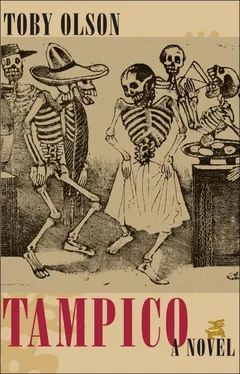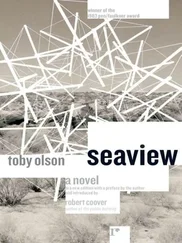He could see the grill of the ruined truck and the sandblasted fenders, hear the gearing and the farts of the gutted muffler, and then the cab was up beside him, shaking on the dirt street at the gate, and he saw the pyramid of cannibalized engine parts above the rails in the long bed, and then he was climbing the metal running board and reaching for the handle.
His father was spiderlike behind the circle of the wheel, his bare arms thin and corded, and he wore a cowboy hat, and as he worked the gears and hit the pedals he leaned into the wheel and almost stood, and Carlos saw a translucent drooling at the corner of his mouth as he grinned at him, his teeth horsey under rheumy, sleep-starved eyes that blinked in sweat that flooded from his brow.
Up out of Tamaulipas and Veracruz, back to the Rio Grande and home to pick up Carlos, they were heading northeast from Matamoros to a wrecking yard in the foothills near Nueva Rosita. There was a buzzing in the primitive cab when they got going and the biting scent of scorched oil coming in through vents and holes in the metal floor, and there was something rancid, and his father was talking, but Carlos couldn’t get his language through the grind of gearing and the engine noise, and he knew he was there for work and not fellowship, and he turned away from his father’s groggy gestures and kept his eyes on the road.
They stopped once at a place near Anáhuac, wooden picnic tables under a greasy awning beside gas pumps, and something under thick brown gravy, carrots and corn bread, and real truckers calling out the names of destinations, Chihuahua, Juárez, Hermosillo, and Carlos watched them rise and stretch and head for their massive rigs, and others replaced them, and these looked at the two, wondering about this gringo traveling with an Indian boy, and his father couldn’t find it in himself to eat and only sipped coffee and sweated and stuck cigarettes into his mashed potatoes, then rose finally into the curse of his Mexican blood, that frustrated anger Carlos recognized as who he was, and they were out of there, and in two hours or more had dumped the parts and loaded the bed again, industrial sewing machines, bobbins and thick spools of thread for delivery to a warehouse in Valle Hermoso on the return trip home.
They were on the road again and descending, geared down to fight the heavy load behind them, and it was late afternoon and the clouds of insects came in against them and they couldn’t see, and his father fought the gears and brought the truck to the dusty shoulder and leaned back in the pelting and said he needed some rest. His eyes were milky, his words muffled in the dirty towel he lifted and pressed to his face, and Carlos felt a humming in the seat and saw him vibrating, his hat and then his arms, and there was a certain yearning in his face when he lowered the towel and looked at him again, and Carlos knew right then that he’d be leaving.
They were in the foothills still, but had moved down to the higher desert, and once the plague passed over they climbed down and below the shoulder and through the dry gulch and headed up the low rise among prickly pear, wildflowers and stones, to where the oak cast shadows out over an oasis of thick grass, and his father lay down in the grass and rested his head against the tree’s base, his face under his hat, and Carlos stood over him, below the branches.
They were high enough, not far from home, and Carlos could see out over the desert plains, the dusty, earthen buildings of Matamoros, and beyond that sad clustering, the blue gulf and even a hint of whitecaps he thought, as he stepped forward squinting, then heard his father groan in sleep and turned quickly and struck his head against a low limb. He was quaking, slipping from himself, falling to a hazy ground and into a posture that was not from falling, but for sleeping, and when he awakened it was dusk and he was looking up through the skeletal figures of the oak’s branches and could see the first stars, blocked then by his father’s hat brim, and could hear the urgency, “Carlitos! Despiértate! Carlitos!” Then he was awake, and rising, his father pulling him and pointing, and he saw the flames, and it was as if the whole city of Matamoros was burning, below in the distance across the desert plains, and he felt the fire of the blow in his temple and the swelling, and he knew it was his mother burning and that his father knew that too and that he would soon be leaving, and he couldn’t look into the blue of his gringo’s eyes.
All remnants of a recent sudden rain were gone, and he tipped the visor down against the cold sun and drove in the slow lane, thinking back to the death of Gordon Strickland as he headed for Orleans.
The letter had been propped against the sugar bowl, a white envelope with his name written across it. Much like a letter in a story, it could have been on a mantel. There was one in the living room, holding photographs of Strickland’s parents in antique frames, snapshots of a few men standing together, hips slung in swimming suits with towels hung from shoulders and arms touching on a sandy beach, one of a woman in a broad, theatrical hat, her face unrecognizable in shadow under the brim.
It was seven-thirty when he found it, having slept through Strickland’s leaving. A suicide letter, nothing less, and Carlos had read it with great care, then read it again, and though it was that, it held no despair, but a certain reasoning and a plan for the future. Yet it need not have been written, and before he took it to the sink and burned it, he read it once again.
It was the AIDS and a certain insurance policy. Strickland wrote that he was failing now and the policy had a rider that wouldn’t cover that. But it would cover accident, and the beneficiary was the hospice movement, in the name of a certain man involved with him in that, a Larry Paradise, and there would be no note for him, but he would see to the use of the money properly. He’d sold most everything of value now, and he’d no longer be going to Boston with his New England materials.
There was two thousand dollars in the envelope, wrapped in a sleeve of paper with his name and the words severance pay written across it, and Carlos folded the money neatly and put it in his pocket. Then he drank his coffee and sat at the table and looked out the salt-stained windows. Sparrows danced on the deck rail, and when they left he got up and filled his cup again, then went to his basement room and dressed himself. He worked around the house for the next four days. There was cleaning to be done, tile work in the shower in one of the bathrooms, and in the evenings, when the work was done, he listened to Ives and to pieces by other composers. He went to bed early. The phone rang a few times, but he didn’t answer it, just left the calls to the machine. Then Peter Blue arrived and said the words and Gordon Strickland’s death became actual, and Carlos swallowed up that relationship and the contents of the letter too.
He’d called from Peter’s house before leaving.
“Still completely out,” Charlie said.
“What are the doctors saying?”
“What they’ve been saying. Pneumonia. The fever at least. They say it’s too soon for HIV symptoms, so it isn’t that.”
“Not even delirium?”
“No. Nothing. It was the fact he cracked his head. Falling, you know? That’s what Paradise said. He heard it. Quite a whack I guess. The doctors say that too. Are you coming back?”
“Not just yet,” Carlos said.
“Well, that’s okay. There’s plenty of us here. He doesn’t seem in any real danger. They’ve done tests. Nothing severe. Concussion they think.”
Carlos wondered if Peter was dreaming, in the way he had, just a week ago in the solarium.
Читать дальше












